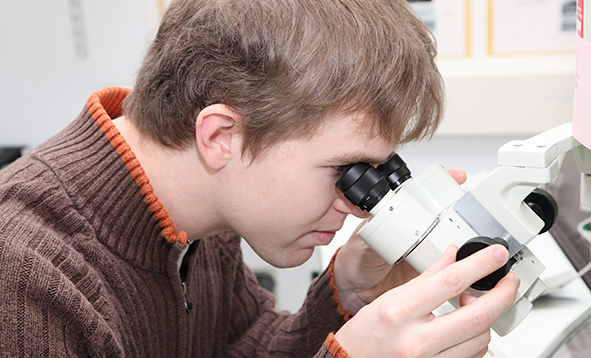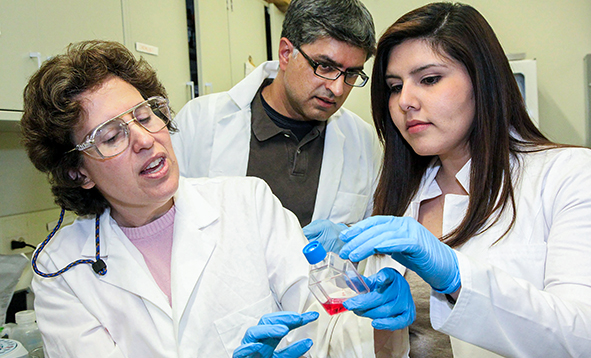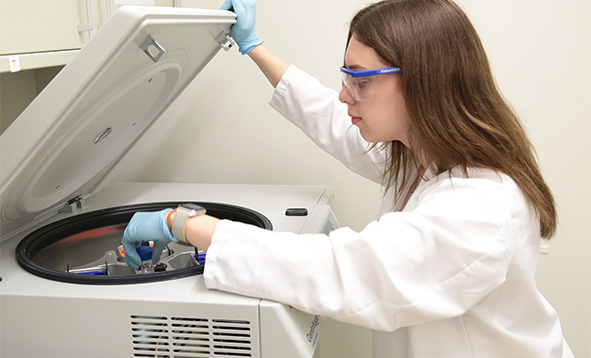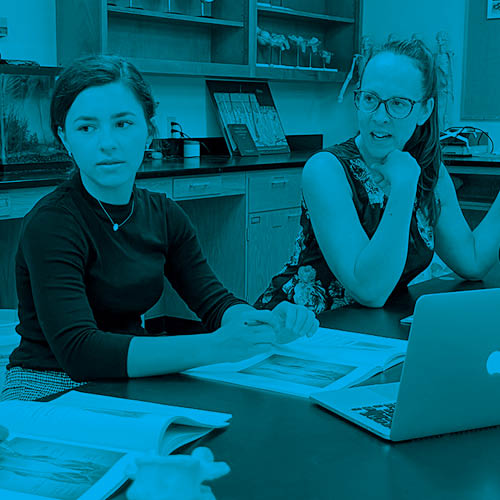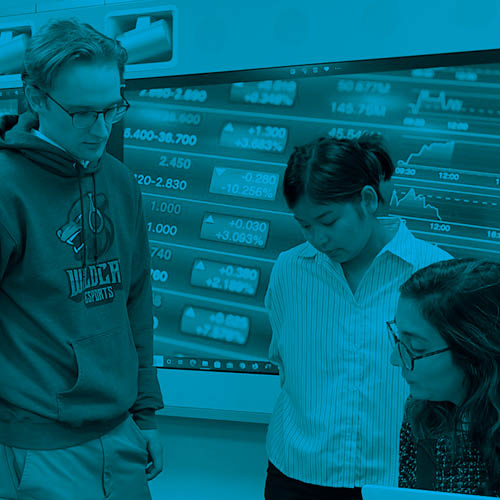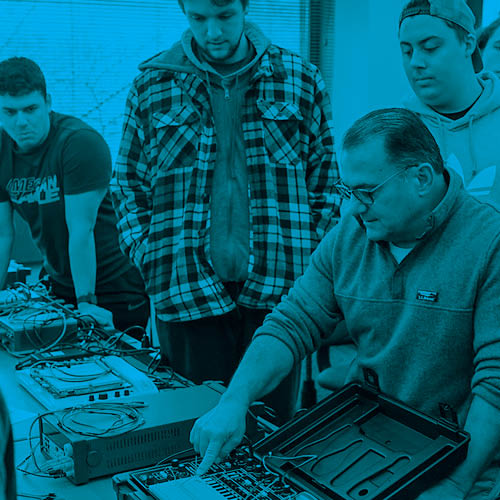Academic Programs Highlights
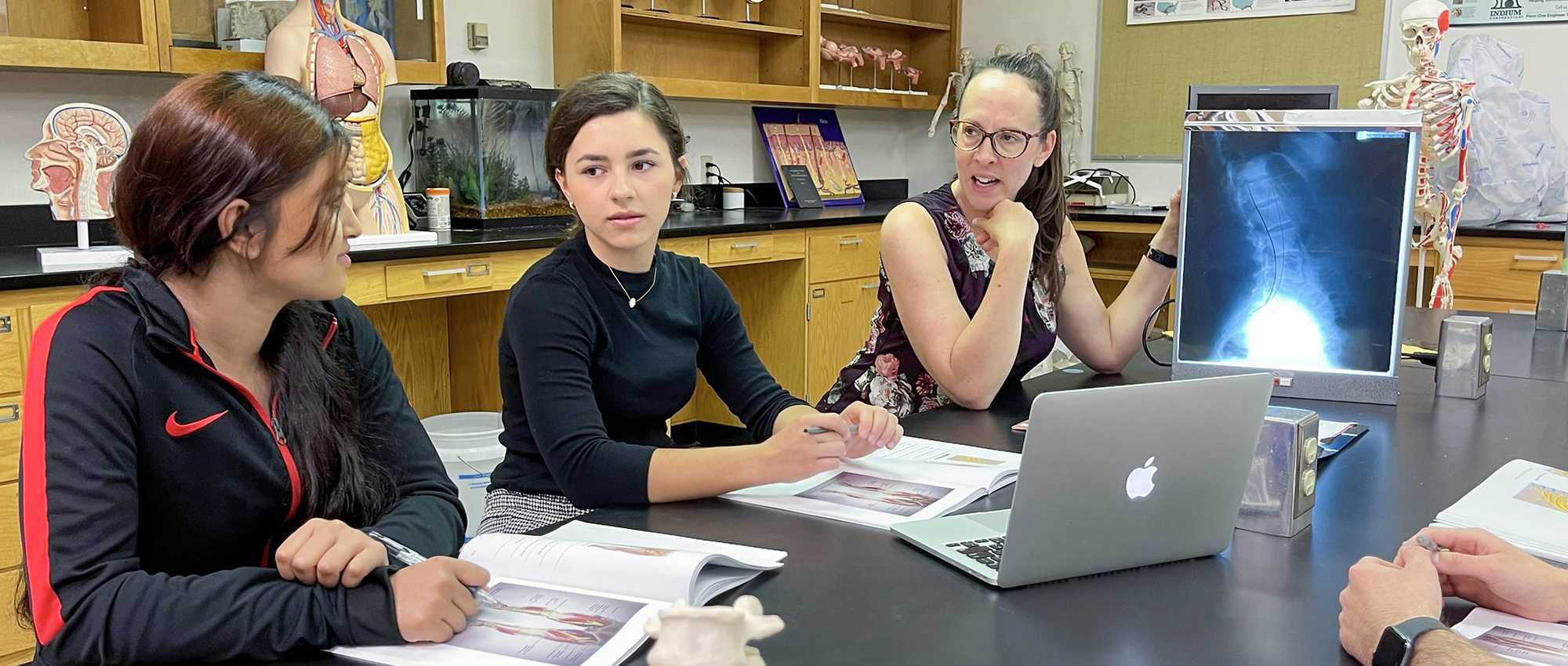
College of Arts + Sciences

SUNY Poly launches MS in Data Science and Analytics Program
Providing students with the knowledge and skills needed to succeed in many professions that deal with complex data is at the heart of SUNY Poly’s newest graduate program, coordinated by Associate Professor of Mathematics, Dr. William Thistleton. Students in the program will learn the latest tools and technologies for analyzing large and complex data sets, preparing them for a diverse range of career paths, such as data analysts, data engineers and machine learning engineers, database administrators, applications architects, statisticians, and professionals in risk management and market research. Learn more here.
Dr. Adam McLain Leads Madagascar Expedition to Research Lemurs; Conducts Genomic Research
In 2022, Dr. Adam McLain led a field expedition that conducted research on a cryptic population of lemurs on the remote island of Nosy Hara, off the northwestern coast of Madagascar. He was also part of a team of scientists that published a high-coverage genome of the Pallas’s cat, a wild cat species endemic to central Asia. In addition, Dr. McLain is a co-PI on a $493,000 NIH/National Institutes of Aging funded project with colleagues from the University of Minnesota that moved forward this year with the sequencing of a very high-coverage dataset. This dataset includes the genomes of multiple species of primates of various ages and sexes, with the goal of advancing understanding of the role that DNA methylation plays in aging.
Faculty Receive $30K SUNY Grant to Establish Library of Methods and Tools for Conventional and Assistive Technology Users
In a collaborative, cross-discipline endeavor, SUNY Poly faculty will create and connect tools and modes for composing and sharing academic and creative works that afford more universal access for authors, editors, and audiences. The project, funded by a $30K SUNY Grant, will respond to needs and interests among blind and visually impaired persons, developing methods and tools shared via a website. The CCAVA team consists of Associate Professor of History Dr. Kristina Boylan; Associate Professor of Mechanical Engineering Technology Dr. Daniel Jones; Assistant Professor of Mechanical Engineering Technology Dr. Jiayue (Joyce) Shen; Assistant Professor of Creative Arts and Technology Dr. Ana Jofre; and Director of Student Accessibility Services Kimberly Corrigan, all of whom have been involved with advancing assistive technologies in the past. They will also be aided by student assistants. Read more.
Dr. Margarita Orlova Explores the Impact of Health Stressors on the Chemical Profile of Honeybee Workers and Queens
Dr. Margarita Orlova, an assistant professor of biology, recently received a grant totaling nearly $10,000 from Pollinator Partnership to investigate how health stressors, such as pathogens, pesticides, and nutritional deficiency, affect the chemical profile of honeybee workers and queens. Dr. Orlova is testing how the exposure to nutritional stress will affect cuticular hydrocarbon profiles and volatiles in experimental groups of honeybees, with the ultimate goal of developing a diagnostic tool, based on chemical signals, that will allow early detection of stress and infection. She is doing this by not only studying nutritional stress, but also its interaction with viral infections and pesticide exposure.
Officer-in-Charge Dr. Andrew Russell Highlights Key Tech Engagements Providing Glimpses into the Future
Dr. Andrew Russell, SUNY Poly Officer-in-Charge, collaborated with Loring G. Robbins and the late James L. Pelkey on an article published in IEEE Spectrum, “The Do-or-Die Moments That Determined the Fate of the Internet.” The publication is centered around the concept of “five meetings that created the internet,” and it focuses on public demonstrations of new networking and internetworking equipment that has shaped the technologies we rely on to communicate instantly around the world. Read more.
Psychological Reports publishes collaborative research by SUNY Poly Professors and Alumni
Psychological Reports published, “Anxiety and Avoidance in Close Relationships Are Associated with Responses to Negative and Positive Stimuli,” research by SUNY Poly’s Dr. Rebecca Weldon, Assistant Professor of Psychology; Dr. Kazuko Behrens, Associate Professor of Psychology; and Dr. Daniel Jones, Associate Professor of Mechanical Engineering Technology; with alumni Erin Drake and Justine Fragetta, who assisted with the research while they were undergraduate students at SUNY Poly. The research article focuses on individual differences in the evaluation of the affective nature of environmental stimuli. The aim of the current study was to examine how anxiety and avoidance in close relationships correlated with valence ratings of positive, negative, and neutral stimuli. Read the study.
Professor Lizardi discusses ‘Millennial Nostalgia’ on ABC News podcast
Dr. Ryan Lizardi, associate professor, and author of the book, “Nostalgic Generations and Media: Perception of Time and Available Meaning,” spoke about a recent trend in the entertainment industry on ABC News’s “Start Here” podcast. He argued that the “entertainment industry encouraged a perpetual attachment to adolescence for the now-grown ’80s and ’90s kids, hoping to make connections to past franchises and hook new generations. He called this practice the creation of ‘eternal brands.’ These reboots target millennials especially – a generation often cited as being particularly prone to nostalgic feelings – and one that is typically defined as those born from 1981 to 1996.” Read more.
Dr. Shing Chi Leung develops new Python software, explores Physics topics with peers
Assistant Professor of Physics Dr. Shing Chi Leung’s year included developing new Python software suitable for modeling gamma-ray signals from stellar explosion events. He and his peers also tackled a number of other topics, including “Dark Matter–admixed Rotating White Dwarfs as Peculiar Compact Objects” (The Astrophysical Journal), “Accretion-induced Collapse of Dark Matter-admixed Rotating White Dwarfs: Dynamics and Gravitational-wave Signals” (The Astrophysical Journal), the origin of Type la supernovae and “Hydrodynamics and Nucleosynthesis of Jet-driven Supernovae I: Parameter Study of the Dependence on Jet Energetics” (The Astrophysical Journal).
Dr. Carlo Cafaro collaborates with AFRL, peers on several research papers
Teaming up with peers at SUNY Poly and beyond, as well as the Air Force Research Laboratory, Dr. Carlo Cafaro, a faculty member in the Mathematics and Physics Department, published research on multiple efforts, titled “Complexity of Pure and Mixed Qubit Geodesic Paths on Curved Manifolds” (Physical Review D), “Comparing metrics for mixed quantum states: Sjoqvist and Bures” (Physical Review A), “A Differential-Geometric Approach to Quantum Ignorance Consistent with Entropic Properties of Statistical Mechanics” (Entropy), and “Qubit Geodesics on the Bloch Sphere from Optimal-Speed Hamiltonian Evolutions” (Classical and Quantum Gravity).
Dr. Andrew Gallup, Sabina Wozny make another ‘yawning’ discovery
Associate Professor of Psychology Dr. Andrew Gallup, with 2023 graduate from the psychology program Sabina Wozny, found that while contagious yawning (CY) can take place across species, there is not a “strong connection between interspecific CY and empathy or emotional contagion.” Their work is published in Animals 2023. Dr. Gallup was also recently featured in an article in the Sydney Morning Herald, titled “What’s yawning for – and is it really contagious?”
Dr. Amir Fariborz’s research published in European Physical Journal
Professor Dr. Amir Fariborz had two pieces of research published this past year on, “Chiral nonet mixing in πη scattering” (European Physical Journal C) and “Non-inertial torques and the Euler equation” (European Physical Journal Plus).
Professors present research at Society for Applied Anthropology Annual Meeting in Cincinnati
This past spring, Professor of Cultural Anthropology Dr. Kathryn Stam and SUNY Poly alumna and adjunct professor of anthropology Anna Woodworth participated in the 83rd annual meeting of the Society for Applied Anthropology in Cincinnati, Ohio. The team presented a videotaped conversation about their research, “Divorce and Separation among Somali-Bantu Refugees in the U.S.” Hawa Juma, SUNY Poly alumna and activist, also contributed to the paper. Support for Woodworth’s participation was provided by a UUP Individual Development Award. Dr. Stam also attended the Association of Social Anthropologists conference called, “An Unwell World: Anthropology in a Speculative Mode,” at the School of Oriental and African Studies (SOAS) at the University of London. There, she presented a talk, “Representation and storytelling from a photo collection of images of resettled refugees taken by refugees themselves.”
Rocket League team captures SUNY Poly’s first Esports title
An Esports title, the first in school history, has been added to the list of accolades achieved by SUNY Poly students. Paul “Trey” Yarwood, Andrew Miroulis and George Reagan, the three-person Wildcat Esports Rocket League team, recently defeated the University of Buffalo in a best-of-seven series at the SUNY Esports Championships in Brooklyn. The SUNY Poly Wildcat Esports organization competes competitively as part of the Eastern Collegiate Athletic Conference (ECAC), SUNY Esports League, and the National Association of Collegiate Esports (NACE) Star League. Read more.
Dr. Vinod Kool’s book, ‘Gandhi’s Wisdom,’ published by Macmillan-Palgrave
Publisher Macmillan-Palgrave recently published a new book, “Gandhi’s Wisdom,” written by SUNY Poly professor emeritus Dr. Vinod Kool. The book, “illustrates applications of Gandhi’s wisdom to scientific research and contemporary social issues, calls attention to cross-cultural issues limiting the current scope of wisdom research, and demonstrates the wide interdisciplinary relevance of Gandhi’s wisdom.” Read more.
Dr. Andrea Dziubek hosts the quadrennial international workshop on “Geometric Mechanics and Structure Preserving Discretizations of Shell Elasticity,” from July 17 to July 28
From July 17-28, Dr. Michael Neunteufel (TU Wien, Austria), Dr. Michael Karow (TU Berlin, Germany), and Dr. Kaibo Hu (U of Oxford, UK) explored Cosserat shell models, which could be the key for deriving structure preserving numerical discretizations of shell elasticity. The “Utica Fall workshops” (2023, 2019, 2015) bring together leading scholars and young researchers (from renowned universities in the U.S., Europe, and Asia) on the fusion of geometry, mechanics, and computation. Dr. Dziubek and Dr. Rusjan (Department of Mathematics and Physics) put SUNY Poly on the map in this cutting-edge field. Read more.
Three professors visiting, conducting research with Dr. Cafaro
The Department of Mathematics and Physics is hosting three professors who are conducting research with Dr. Carlo Cafaro. Dr. Domenico Felice (Ph. D. in Mathematics) and Dr. Christian Corda (Ph. D. in Physics) are volunteer visiting scientists, while Dr. Orlando Luongo (Ph. D. in Physics) is a volunteer assistant professor. They will remain at SUNY Poly until January 31, 2025.
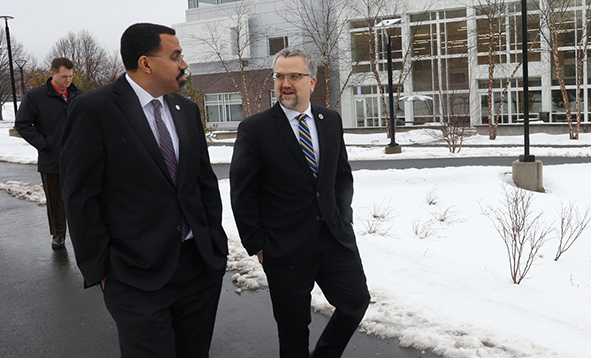
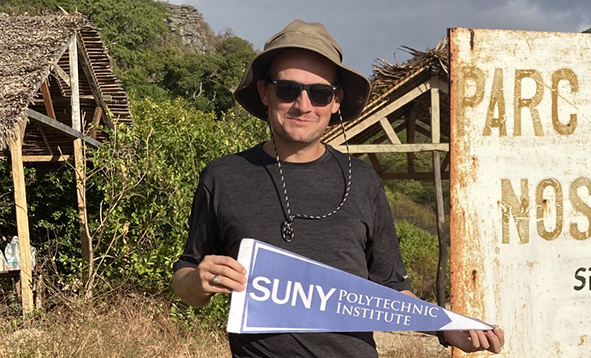
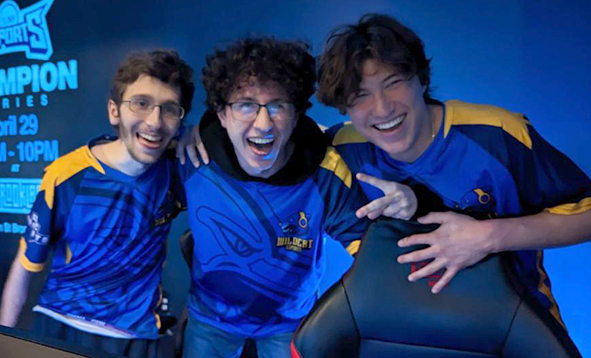

College of Business

COB Students tackle housing issues during InnovationChallenge NY
Dr. Robert Edgell, along with his research collaborator James Moustafellos, then at Temple University, created and launched the InnovationChallenge New York (ICNY) program in 2014. In the fall of 2022, about 50 students participated and generated a dozen highly diverse concepts to address housing issues in the Utica region. ICNY is a unique student competition that generates and transforms novel ideas into actions and greater quality of life in New York State, especially the economic and social well-being of the greater Mohawk Valley REDC region. ICNY serves three primary purposes: it provides students with experiential (applied) learning experience centered on collaborative design and entrepreneurship; it gives communities active engagement and concepts for improving the quality of local life and addressing “grand challenges”; and it is a source of valuable data for behavioral research on entrepreneurial capacity development. Since ICNY’s inception, approximately 800 students, judges, experts, tour site hosts, steering committee members, supporting faculty, volunteers, and other community leaders have participated in eight ICNY iterations. These efforts have yielded 84 concepts for helping our Mohawk Valley regional communities overcome important socioeconomic challenges.
Four SUNY Poly student-led ventures advance in NYBPC
In Spring 2023, the Mohawk Valley regional semifinal of the New York Business Plan Competition (NYBPC) was hosted by SUNY Poly in partnership with Hartwick College. Four SUNY Poly student-led ventures were among the finalists advancing to the finals of the statewide New York Business Plan Competition. In the Safety, Power, and Mobility category, SUNY Poly students Adam Lukasiewicz advanced for their “Logistat” venture. SUNY Poly students Frederick Fougere, Brian Tangorre, Michael Beebe, and John Klaboe’s “Three-Delta” venture moved on in the Learn, Work. and Play category, while SUNY Poly students Miranda Dewan and K’Pru Taw, and David Ramos-Vazquez advanced in the Software and Services category for their “The Proper Tea” and “Arkceus” ventures, respectively. Furthermore, “The Proper Tea” won the $1,000 second place grand prize, while “Three-Delta” took home the $500 Best of Mohawk Valley recognition. Read more.
SUNY Poly recognized by Fortune for 100% Online MBA three-year graduation rate
There are only two schools in the nation with a 100 percent three-year graduation rate among Fortune’s best online MBA programs, one of which is SUNY Poly. Dr. Rafael Romero, who chairs the Management Department, told Fortune that the key to the perfect graduation rate is the, “dedicated advising department that’s housed directly in-school and operates independently from the career counseling department on-campus.” For example, the department’s two dedicated advisors are reachable by cell phone for any students who want to discuss anything going on in their personal lives that may impact their performance in the program. Read more.
Accounting, Finance, and Technology Management Programs earn top marks
SUNY Poly was ranked No. 4 in the nation for 2023 Best Online Master’s in Accounting Program by Fortune. Furthermore, our Accounting and Finance Programs ranked No. 10 (Best Online Bachelor Degree Programs in Accounting) and No. 11 (Best Bachelor’s of Finance Degrees) in the nation, respectively, by Best Accredited Colleges. SUNY Poly’s MS in Accounting caught the eye of U.S. News and World Report, ranking 33rd in the nation, while the MBA in Technology Management with a concentration in Accounting and Finance, was listed among the best in the nation by OnlineMBACoach. The MBA in Technology Management with a Health Informatics concentration was also ranked 15th in the nation by OnlineMBACoach.
Forbes recognizes Online BSBA program
SUNY Poly’s fully online Business Administration Degree Program was featured as one of the best by Forbes. Among the reasons for picking it, Forbes said, “The program combines asynchronous and synchronous coursework covering marketing principles, organizational behavior, management science and managerial science…Learners can tailor their curriculum to include minors in areas like actuarial mathematics, accounting, ethics, and interdisciplinary inquiry and problem-solving.” Read more.
Dr. Robert Edgell, Dr. Daryl Lee team up on published research
Associate Professor of Humanities Dr. Daryl Lee and Professor of Technology Management Dr. Robert Edgell published, “Theorizing creative challenges: Why are social creativity and reimagined universities necessary for tackling society’s problems?” in the Journal of Creativity. The article seeks to understand why social creativity is an important variable for a theory of creative challenges and why educational institutions can, if reimagined, be ideal for developing this capacity. Ultimately, the research group clarifies “rationales for why social creativity, comprising interdisciplinarity, design thinking, and entrepreneurial acumen, as well as the university reimagined are critical for more complete theorizing about creative challenges.” Read more.
HR MBA Concentration highlighted by Intelligent.com
SUNY Poly’s Technology Management MBA with a Human Resources concentrations was named on Intelligent.com’s “Best Online MBA in Human Resources Programs in 2023” list. Read more.
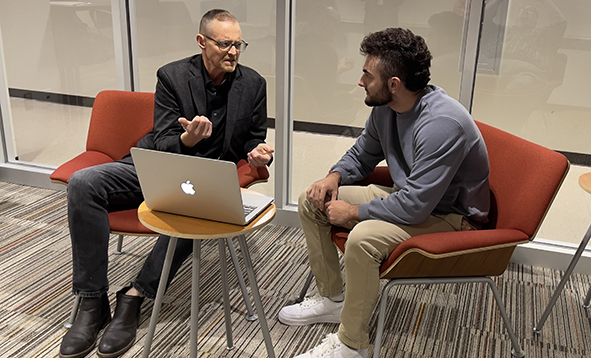



College of Engineering

Dr. Hisham Kholidy Secures Largest Single-Investigator Grant in History of SUNY Poly
Associate Professor and Chair of the Network and Computer Security (Cybersecurity) Department, Dr. Hisham A. Kholidy, has been awarded a nearly $1.1 million contract from the Air Force Research Laboratory (AFRL) for a 36-month project that will help address the need for an advanced security system that can identify, assess, and protect against attacks across the 5G open architecture in a timely and accurate way without human intervention. The grant is not only significant in its total amount, but also because it is the largest single-investigator award ever received at SUNY Poly’s campus, located in Utica. Read more.
SUNY Poly Announces $750,000 in Funding from NSF to Support Degree Completion for Students in Engineering and Engineering Technology Programs
Associate Professor of Engineering Dr. Carolyn Rodak, with co-investigators Associate Professor of Mathematics Dr. Edmond Rusjan, Assistant Professor of Engineering Dr. Jiayue Shen, and Andrew Cotronea, SUNY Poly Coordinator of the Collegiate Science and Technology Entry Program (CSTEP ), received $750,000 in funding from the National Science Foundation Scholarships in Science, Technology, Engineering, and Mathematics (S-STEM) program. The award seeks to support degree completion by students in engineering and engineering technology programs by focusing on experiential learning and self-directed professional development to further bolster New York State’s innovation workforce. Read more.
Two Grants Totaling $568K To Establish Offshore Wind Training Team, Workforce Development Efforts
SUNY Poly received two grants totaling $568,000. The first grant for nearly $400,000 will establish the SUNY Poly Offshore Wind Training Team (SPOWT²). The SPOWT² will prepare SUNY Poly students for careers in the offshore wind industry, enhance the faculty’s expertise on the subject, as well as fund scholarships for underrepresented and non-traditional populations interested in the field. The project is led by SUNY Poly Associate Professor of Civil Engineering, Dr. Zhanjie Li. Read more.
SUNY Poly, UBuffaloTeam up on UnionLabs Project Enabling Shared Testbed Resources
Faculty at SUNY Poly and the University at Buffalo (UB) have partnered on a project called, “SUNY OpenIoTLab: The SUNY Laboratory Federation for Wireless Intelligent Internet of Things.” The two universities recently announced that the project is a recipient of a $60,000 SUNY Innovative Instruction Technology Grant. Ultimately, the project will develop UnionLabs, an open, cloud-enabled federation of heterogeneous testbeds for sharing data, code, software and hardware resources for research in next-generation networks and wireless Internet of Things. Currently, there isn’t a mature and shared facility to support rigorous and repeatable experimental evaluation of wireless networked systems, which have seen significant change in past decades. This joint effort, led by UB’s Dr. Zhangyu Guan and Dr. Nicholas Mastronarde, and SUNY Poly Associate Professor in the Electrical and Computer Engineering Program Dr. Timothy E. Busch, will work to address that need, along with key project personnel Associate Professor Michael J. Medley, Associate Professor Daniel Benincasa, and Adjunct Professor Chester Wright, with Assistant Professor Arjun Singh also joining the project. Read more.
Dr. Asif Ahmed receives $50K from the NSF for Commercialization of Recycled Plastic Pins to Stabilize Sloped Highways Project
Assistant Professor of Engineering Dr. Asif Ahmed received $50,000 in total funding from the National Science Foundation to further develop and commercialize plastic pins that can be used to enhance the stability of sloped highways, with partner, the University of Texas at Arlington, receiving $15,000 of the total to advance entrepreneurial goals. The pins are made from recycled materials, supporting environmental sustainability, and can last for decades, making highways that use them more robust. Read more.
Faculty Receive $30K SUNY Grant to Establish Library of Methods and Tools for Conventional and Assistive Technology Users
In a collaborative, cross-disciplinary endeavor, SUNY Poly faculty will create and connect tools and modes for composing and sharing academic and creative works that afford more universal access for authors, editors, and audiences. The project, funded by a $30K SUNY Grant, will respond to needs and interests among blind and visually impaired persons, developing methods and tools shared via a website. The CCAVA team consists of Associate Professor of History Dr. Kristina Boylan; Associate Professor of Mechanical Engineering Technology Dr. Daniel Jones; Assistant Professor of Mechanical Engineering Technology Dr. Jiayue (Joyce) Shen; Assistant Professor of Creative Arts and Technology Dr. Ana Jofre; and Director of Student Accessibility Services Kimberly Corrigan, all of whom have been involved with advancing assistive technologies in the past. They will also be aided by student assistants. Read more.
$15K SUNY Grant Brings Virtual Reality Tech to SUNY Poly
The use of Virtual Reality (VR) and Mixed Reality (MR) technology in the automotive, manufacturing, and construction industries is on the rise. Now, a $15,000 SUNY Innovative Instruction Technology Grant (IITG) supporting the Virtual Reality for Engineering Education project will create an interactive learning module and virtual labs, benefitting SUNY Poly engineering and interactive media and game design (IMGD) students by providing access and experience in using this critical technology. The goal of the project, which is led by Associate Professor of Civil Engineering Dr. Zhanjie Li, Assistant Professor of Mechanical Engineering Technology Dr. Jiayue (Joyce) Shen, and Assistant Professor of Interactive Media and Game Design Dr. Se Jung Kim, is to explore and develop a non-proprietary library of VR videos and models related to solid mechanics, structures, and mechanical equipment, including the creation of virtual labs of solid mechanics and structural analysis through VR models. Read more.
$7K Grant Funds Project Developing and Applying Infrastructure Performance Metrics for Wastewater Systems in Upstate NY
Associate Professor of Civil Engineering Dr. Carolyn Rodak received a $7,296 grant from Cornell University’s Water Resources Institute, primarily funded by the New York State Department of Environmental Conservation (DEC), for a project that developed and applied infrastructure performance metrics for wastewater systems in Upstate New York. The grant supported rising senior and Civil Engineering major Chance Walker’s work on the project. They applied three performance metrics—Reliability, Resilience, and Vulnerability (RRV)—from water resources literature in evaluating the occurrence of sewage releases in the Mohawk Valley Watershed. Read more.
Research Initiative to Improve Public Transportation and Infrastructure
SUNY Poly was awarded funds from the U.S. Department of Transportation, as researchers participate in the overall $5 million research effort spearheaded by CUNY in collaboration with nearly one dozen colleges and universities from across New York State, New Jersey, and Puerto Rico. As part of the new Center for Social and Economic Mobility for People and Communities through Transportation, or SEMPACT, SUNY Poly researchers will assess public transportation and infrastructure needs through the strategic use of probes and sensors. This work is anticipated to culminate in a final evaluation of strengths, weaknesses, and opportunities made possible by obtaining and studying private sector traffic data in targeted transportation corridors. Read more.
Mechanical Engineering Students take third place at CREATE Symposium
Mechanical Engineering seniors Zachary Byrum and Luke Handerhan captured third place and a $5,000 prize at the New York State Industries for the Disabled, Inc. (NYSID) 2023 CREATE Symposium in April. College engineering students from around the state demonstrated the inventions they created in collaboration with disability service providers. Byrum and Handerhan’s “Scrub Pad Cutter,” a machine that cuts raw scouring pad material into circles of varying diameters and roughness, facilitates the Arc Oneida-Lewis Chapter’s plans to employ up to five employees with disabilities in its own manufacturing setup to produce the scrub pads, rather than purchase pads from an outside source. Read more.
Computer Engineering Program Earns Favorable Ranking from Best Universities
Best Universities ranked SUNY Poly among the “Top Ten Schools for Computer Engineering” in the nation. They noted: “SUNY Polytechnic Institute takes a standard computer engineering degree and transforms it into a multi-disciplined program. After graduation, you’ll have experience in many areas such as math, liberal arts, and science. You’ll also find this program is unique as it focuses on electrical and computer engineering simultaneously…” Read more.
SUNY Poly Students’ Research Paper Accepted to IEEE International Conference in Venice, Italy
The research paper of four of SUNY Poly’s Institute of Electrical and Electronics Engineers (IEEE) Club students titled, “Performance Analysis of Deployment Errors for a Two-Stage Antenna in CubeSat Constellations at THz Frequencies,” was accepted into the proceedings of the IEEE UCEAA Conference in November in Venice, Italy. Ultimately, if the research is deployed, it could lead to a novel breakthrough in the design of CubeSats, extremely small satellites that are usually a few centimeters in size that can be used in space. The new design would strengthen communication and data transmission in space, and help facilitate non-terrestrial networks. The group consists of electrical and computer engineering majors Isaac Martin, David Stark, and Luke Lauterbach, and electrical engineering technology major Devin DiTucci. They were advised by Assistant Professor of Electrical and Computer Engineering Dr. Arjun Singh.
Dr. Abolfazl Karimpour Explores Transportation Topics in Published Research
Assistant Professor of Transportation Engineering, Dr. Abolfazl Karimpour, had research on three transportation topics published this past year. This included studying queue lengths at intersections (Transportation Research Record), proposing A data-driven approach to estimating dockless electric scooter service areas (Journal of Transport Geography), and research titled, “Modeling red-light running behavior using high-resolution event-based data: a finite mixture modeling approach” (The Journal of Intelligent Transportation Systems).
Dr. Arjun Singh publishes wireless communications research
Earlier this year, Assistant Professor of Engineering Dr. Arjun Singh published advanced wireless communications research, related to reinventing the physical layer of 6G or 7G wireless. He’d also publish research on Frontiers in Communications and Networks, Non-Conventional Communications and Networks, which highlights progress related to the 6G landscape.
Electrocardiography at the center of research by Dr. Bongmook Lee
IEEE Sensors Journal published, “A Wearable Electrocardiography Armband Resilient Against Artifacts,” collaborative research by Associate Professor of Engineering Technology, Dr. Bongmook Lee and peers, which focuses on electrocardiography (ECG), “an essential technique to assess cardiovascular conditions and monitor physical activities.” The research team presented a “high-performing wearable ECG armband on the upper left arm” with an improved design using an electronic textile (E-textile) armband to provide “real-time and noise-resilient ECG data without interrupting daily life and can be implemented in use cases that warrant continuous ECG monitoring.” Read more.
Dr. Li Explores Advanced High-Strength Steel Members Optimization
Associate Professor of Engineering Dr. Zhanjie Li’s collaborative research, “Free-Form Shape Optimization of Advanced High-Strength Steel Members,” was published by Buildings 2022. The research aims “to establish a shape optimization method for cold-formed sections with advanced high-strength steel (AHSS) and explore the potentially material efficiency that AHSS could provide to these sections in terms of their axial strength.” Read more.
Professors Dr. Badr & Dr. Kholidy Team Up on Collaborative Electricity Fraud Detection Research
Assistant Professor of Network + Cybersecurity Dr. Mahmoud Badr and Associate Professor and Department Chair Dr. Hisham Kholidy, with researchers from Benha University, George Mason University, Idaho State University, the Center for Advanced Energy Studies, and Tennessee Technological University published, “Review of the Data-Driven Methods for Electricity Fraud Detection in Smart Metering Systems,” in Energies 2023. The article seeks to address problems stemming from how “malicious consumers tamper with their SMs (smart meters) to report low readings to reduce their bills. This problem, known as electricity fraud, causes tremendous financial losses to electric utility companies worldwide and threatens the power grid’s stability.” Read more.
Dr. Sivapalan Gajan Publishes Foundation Stability Research
College of Engineering Associate Professor Dr. Sivapalan Gajan published research in Geotechnics 2022, providing a “data-driven predictive models for peak rotation and factor of safety for tipping-over failure of rocking shallow foundations during earthquake loading using multiple nonlinear machine learning (ML) algorithms and a supervised learning technique.” Read more.
Dr. Asif Ahmed Assists in Documentation of Hurricane Ida Damage
In the aftermath of the Hurricane Ida, the National Science Foundation (NSF) deployed its Geotechnical Extreme Events Reconnaissance (GEER) team to document the devastation caused by the Category 4 storm. The team, co-led by professors at the University of California-Berkeley and Louisiana State University, included SUNY Poly Assistant Professor of Engineering Dr. Ahmed. After Hurricane Ida hit the shore of Louisiana, which caused subsequent flooding in the northeastern states a few days later, the GEER team was formed to obtain valuable information that can be used to advance research and improve engineering practice. Dr. Ahmed contributed to the New York City portion of the report. Read more.
Dr. Badr Proposes Privacy-preserving and Communication-efficient Federated Learning (FL)-based Energy Predictor for Net-Metering Systems
Research by Assistant Professor of Network and Computer Security Dr. Mahmoud Badr titled, “Privacy-Preserving and Communication-Efficient Energy Prediction Scheme Based on Federated Learning for Smart Grids,” was published in the IEEE Internet of Things Journal. Dr. Badr proposes a privacy-preserving and communication-efficient Federated Learning (FL)-based energy predictor for net-metering systems. Based on a dataset of real power consumption/generation readings, the paper first proposes a multi-data-source hybrid Deep Learning (DL)-based predictor to accurately predict future readings. Then, it repurposes an efficient Inner-Product Functional Encryption (IPFE) scheme for implementing secure data aggregation to preserve the customers’ privacy by encrypting their models’ parameters during the FL training. Read more.


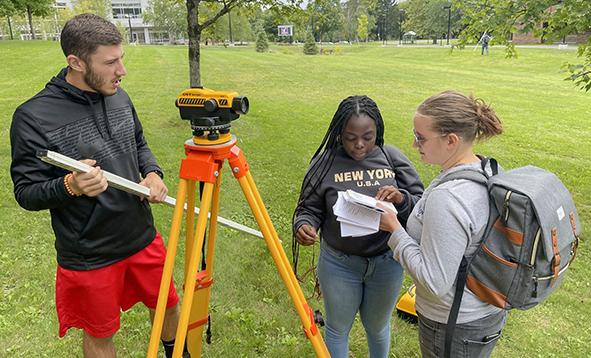
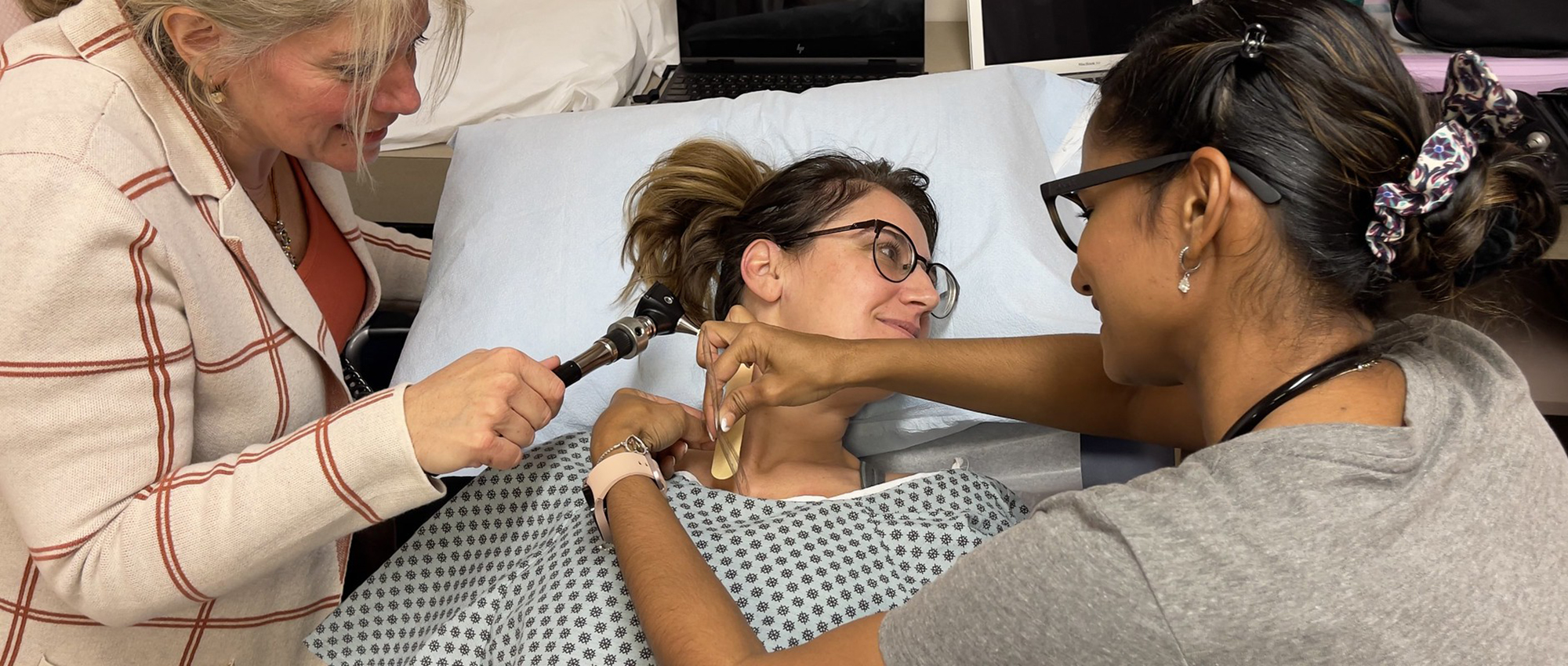
College of Health Sciences

SUNY Poly awarded $1.4 via Liberty Partnership Program to Deliver Research-Based Programming to Herkimer County Students
In July, SUNY Poly held a variety of summer programs for Herkimer County students as part of the Liberty Partnership Program. This comes after SUNY Poly was awarded more than $1.4 million from the New York State Department of Education through a Liberty Partnership Program grant in March to serve hundreds of at-risk students in the region who currently attend grades 5-12 by engaging them in a mixed-model school- and after school-based effort. The initiative seeks to facilitate positive outcomes and decrease the chances of students deciding to drop out of school. To meet this critical goal, the program recruits and selects qualified students to participate; employs family engagement and case management strategies; and engages students in career and educational goal-setting, civic-minded projects, and after school and summer activities. The five-year grant enables SUNY Poly students to serve as mentors and provide Liberty Partnership Program participants with information about various vocational careers they might choose. Participants include students from Little Falls City School District, Herkimer Central School District, Central Valley Central School District, Dolgeville Central School District, Frankfort-Schuyler Central School District, and Mt. Markham Central School District. In July, students participated in sessions where they learned how to build a self-driving car from Dr. Jiayue (Joyce) Shen and learned tabletop game board design from Mr. Matthew Powers. Read more.
SUNY Poly’s Nursing Program Deploys New Pelvic Simulator to Support Experiential Learning
The College of Health Sciences announced the addition of a brand new state-of-the-art pelvic simulator to its nursing program in January. Procured through a SUNY Performance Improvement grant meant to help address the urgent nurse shortage, this high-tech $57,000 simulator is designed to replicate the female pelvic exam and provide real-time feedback to students and faculty, enabling on-demand training. The simulator is used primarily in the Family Nurse Practitioner graduate program’s advanced health assessment course to help support student learning in a controlled environment before entering the clinical setting. In addition, it’s also available for use as part of the undergraduate student nursing health assessment course. All SUNY Poly undergraduate and graduate students enrolled in the Health Assessment, Advanced Health Assessment, Women’s Health, and Primary Care courses will be able to use the simulator with faculty supervision. Read more.
Professors Arif Rana and Jerome Niyirora Publish Health-Related Research
The late Dr. Arif M. Rana, Associate Professor of Health Informatics and Information Management and his colleagues published a peer-reviewed paper titled, “Formative Evaluation of Using Action Learning in a Master of Medical Education Assessment and Measurement Course” in Cureus. Dr. Rana and Dr. Jerome Niyirora, Program Coordinator and Associate Professor of Health Informatics and Information Management, also co-authored a peer-reviewed paper on the use of hyperbaric oxygen therapy on veterans with mild traumatic brain injury.
Professor Tichenor Publishes Book with Sister on Childhood Trauma
Professor Veronica (Ronni) Tichenor, with her sister, Jennie Weaver, a board-certified Family Nurse Practitioner with over 25 years of clinical experience in family practice and mental health, published a book, “Healing Begins With Us: Breaking the Cycle of Trauma and Abuse and Rebuilding the Sibling Bond.” Ronni and Jennie grew up in a home with addiction, mental illness, and abuse issues that generated unhealthy dynamics and often pitted them against each other. In this book, they tell the raw truth about their childhood experiences, including the abuse that occurred between them. As they moved toward adulthood, they managed to chart a path that allowed them to heal their relationship and break the cycle of inter-generational trauma and abuse in creating their own families. Using their personal and professional experience, they illuminate the dynamics in abusive homes, and present information that can help others who are looking to recover from their own painful upbringings, or heal their sibling relationships. Read more.
SUNY Poly’s Online RN to BS Program Ranked Top Five in New York State
SUNY Poly’s program offering a bachelor’s of science with a major in nursing to current registered nurses (RNs) through the College of Health Sciences was ranked No. 5 in New York State by RegisteredNursing.org. The online RN to BS program is designed to serve licensed registered nurses from state-approved associate or diploma nursing programs who are prepared to focus on their professional and career development. Most courses are offered in an asynchronous format, which provides working nurses with maximum flexibility to engage in coursework. Through various partnerships with statewide healthcare institutions, students are able to attend synchronous classes virtually and conveniently fulfill practicum requirements.
College Consensus Ranks College of Health Sciences Program Top 50
College Consensus released their 2023 rankings, with SUNY Poly earning a Top 50 ranking in the “Best Online Ph.D. Programs” category for its Doctor of Nursing Practice (DNP) with specialization in Psychiatric Mental Health Nurse Practitioner (PMHNP) Program.
College of Health Sciences Programs featured in Forbes
The article “Mini Medical Programs For High School Students,” in Forbes highlighted SUNY Poly’s Accelerated Scholars Program in February. Forbes also published an exclusive interview providing a look at the BS/MD Program.
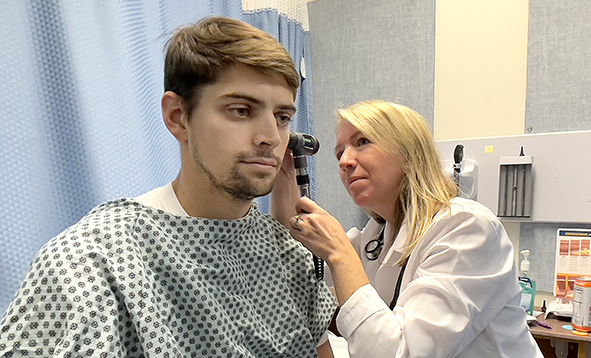
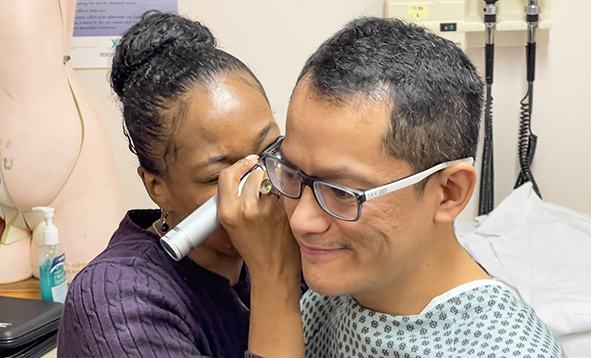
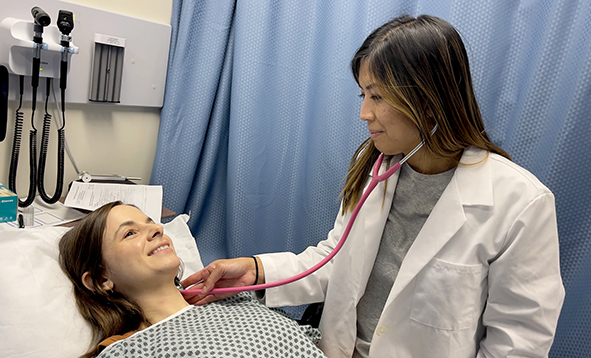

College of Nanoscale Science + Engineering

*CNSE was transferred to the University at Albany in August 2023
Center for Strategic and International Studies Cites CNSE for its on-site wafer fabrication education capabilities
The College of Nanoscale Science and Engineering was mentioned in an article by the Center for Strategic and International Studies titled, “Reshoring Semiconductor Manufacturing: Addressing the Workforce Challenge.” In the article it said, “Only a small number of U.S. universities have on-site wafer fabrication facilities sufficiently sophisticated enough to enable students to gain hands-on chip-making experience in a factory environment…There is only one university site in the United States where the most advanced 300 mm manufacturing facilities are available: the State University of New York’s Albany Nanotech Complex, home of SUNY (Poly’s) College of Nanoscale Science and Engineering. Upgrading a university fab even to 200 mm wafer size—a generation behind 300 mm—would cost $80 million initially and $80 million a year afterward, investments on a scale impossible for many academic institutions.”
Spinoffs Lux Semiconductors and NoMIS Power continue to pick up steam
Two alumni spinoffs, Lux Semiconductors and NoMIS Power, continued their upward trajectories in 2022-23. In February, four venture capital groups provided Lux Semiconductors with $2.3 million in seed-round funding to develop a new generation of advanced chip packaging, which promises to provide chip designers increased performance and lowered cost. The round was led by Ultratech Capital Partners, with participation from AIN Ventures, Hemisphere Ventures, and Lockheed Martin Ventures. The new funding will accelerate the commercialization of System-on-Foil, set to deliver ‘More than Moore.’ For the past 50 years, semiconductor innovation has been achieved through unrelenting miniaturization of the transistor, following Moore’s Law. But the end of Moore’s era is now in sight, and an industry consensus on a new path forward has emerged – transistor miniaturization will give way to system miniaturization. Now, state-of-the-art chips will be partitioned into smaller ‘chiplets’ and reconnected inside advanced chip packaging.
In March, spin-out NoMIS Power embarked on an exciting new partnership with global automotive leader Hyundai Group, South Korea to evaluate and develop novel power semiconductor device designs and packaging for high voltage power devices. Working in collaboration with a network of partners across areas related to materials, device design, fabrication, and packaging, the NoMIS team will explore the suitability of different novel device architectures and packaging approaches for high voltage applications. The project evaluates Gallium Oxide (Ga2O3) Schottky Diodes, MEtal-Semiconductor Field Effect Transistors (MESFETs), and Metal–Oxide–Semiconductor Field-Effect Transistors (MOSFETs) with different gate structures and field management approaches to identify a path to next-generation performance in wide-bandgap power semiconductor devices. Ultimately, this means the next-generation power semiconductor device could lead to potential applications that include improved electric vehicle motor drives and on-board/off-board chargers with enhanced power density and efficiency beyond today’s technological performances. NoMIS was also highlighted in the Albany Business Review as a reason to “move to the Northeast.”
More recently, NoMIS Power received an award from the U.S. Air Force Research Laboratory (AFRL) to develop rugged Silicon Carbide (SiC) power devices to support the electrical power systems of aircraft.
NoMIS Power will develop 1200 V SiC power semiconductor devices (PSDs) through the award. The focus will be on metal-oxide-semiconductor field-effect transistors (MOSFETs) with enhanced operational lifetime as well as improved on-state and off-state efficiency at operating temperatures, resulting in lower losses for power electronics engineers to manage. Read more.
Two Grants Totaling $568K Will Establish Offshore Wind Training Team and Workforce Development Efforts at SUNY Poly
In June, SUNY Poly received two grants totaling $568,000. The first grant, to the College of Engineering, for nearly $400,000 will establish the SUNY Poly Offshore Wind Training Team (SPOWT²). The second grant, for $168,000, supports the development of a micro-credential program focused on offshore wind technology and training. This program is a collaboration between Farmingdale State College (FSC) and CNSE, where Professor of Nanoengineering Dr. Haralabos Efstathiadis leads the program to facilitate students gaining hands-on training on state-of-the-art equipment to test materials used in the blades of the wind turbines. They will learn about the development of materials to prevent micro-cracks and also protect them from degradation and corrosion. Read more.
$500K Grant secured for 30-Minute COVID-19 Antibody Test in Partnership with Ciencia, Inc., NYS Dept. of Health, Wadsworth Center
A $500,000 grant from Empire State Development’s New York State Biodefense Commercialization Fund supported bringing a more affordable and accurate 30-minute COVID-19 antibody test to market in partnership with Ciencia, Inc. and the New York State Department of Health, Wadsworth Center. This research, led by Interim Vice President for Research and Empire Innovation Professor of Nanobioscience, Dr. Nate Cady, leveraging Ciencia, Inc.’s high sensitivity fluorescent plasmonic platform, and with the Wadsworth Center, could enable detailed immune profiling, allowing for the detection of COVID-19 antibodies that define vaccination status, prior exposure, and immunity against key variants. Read more.
$459,000 Award from the National Cancer Institute to Research How Lack of a Key Nutrient Promotes Aging and Cancer
SUNY Poly and the University at Albany’s collaborating research teams received a $459,000 grant from the National Cancer Institute (NCI), part of the National Institutes of Health, to investigate how a selenium deficiency can chemically modify RNA, which may promote aging and cancer. This research, led by Interim Dean of CNSE André Melendez, and Thomas Begley, Associate Director of The RNA Institute in UAlbany’s College of Arts and Sciences, utilizes cutting-edge tools available for biomedical and life science-focused research at both institutions. Concurrently, undergraduate and graduate students attending SUNY Poly CNSE as well as UAlbany gain firsthand lab experience and training opportunities in RNA science and technology throughout the grant’s three-year research term. Read more.
Dr. Woongje Sung Awarded $325K for Development of More Cost Effective and Reliable Power Electronics Devices
Associate Professor of Nanoengineering Dr. Woongje Sung was selected to receive $325,000 in total funding from Sandia National Laboratories for the development, process simulation, and eventual manufacture of bi-directional field effect transistors (BiDFETs) which ultimately bring significant benefits in terms of cost reduction and improved reliability to Silicon Carbide (SiC)-based devices, which are used in a range of applications, such as electric drive trains in electric vehicles. The first grant for $225,000 is a collaborative research endeavor with The Ohio State University and NoMIS Power, a SUNY Poly spinoff led by post-doctoral researcher Adam Morgan, and the second grant of $100,000 is focused on BiDFETs for grid-tied energy storage. This project represents a seamless continuation of Dr. Sung’s ongoing effort where his research team currently engages in the development of 1.2kV SiC rugged metal-oxide-semiconductor field-effect transistors (MOSFETs), computer chip “switches” specifically designed for electric vehicle (EV) applications. The project is generously supported by the Vehicle Technology Office of the Department of Energy (DoE). Read more.
Dr. Ji Ung Lee Awarded $150K to Develop Novel Approach to Increasing Transistor Density in Computer Chips
Professor of Nanoscale Engineering Dr. Ji Ung Lee was awarded $150,000 in funding from the SUNY Applied Materials Research Institute (SAMRI) to develop new stacking processes for increasing transistor density in computer chips. By using novel interconnect technology between different transistor layers, this stacked arrangement can serve as a more cost-effective alternative to shrinking transistors and potentially lead to faster, more power-efficient computer chips. SAMRI is a strategic alliance between the State University of New York (SUNY) and Applied Materials, Inc. that serves as a nucleus of research and development activities on advanced materials, devices, manufacturing, and emerging areas of science and technology. SAMRI is a key component of Applied’s broader collaborations in New York, which include the Materials Engineering Technology Accelerator (META Center) at the Albany NanoTech Complex and a venture capital co-investment initiative with the State of New York. Read more.
$112,000 in Funding from CDC-NIOSH to Support Semiconductor Industry Health and Safety
Nicole Neu-Baker, Research Associate for NanoHealth Initiatives; Maxwell Lippitt, Advanced Manufacturing Performance (AMP) Center Project Engineer; Dr. Tina Ovitt, Environmental Engineer; and Kassey Rydberg, Associate Vice President of Environmental Health and Safety at the New York Center for Research, Economic Advancement, Technology, Engineering and Science (NY CREATES) received a total of $112,000 through cost-sharing Intergovernmental Personnel Act (IPA) agreements from the Centers for Disease Control and Prevention, National Institute for Occupational Safety and Health (CDC-NIOSH). The funds enable the research team to work with NIOSH to engage with identified semiconductor industry partners to find occupational health and safety (OHS) gaps and needs for the industry, in addition to finding ways to address any OHS hazards. New guidance will be widely communicated to support the health of the semiconductor workforce, further facilitating the sustainability of computer chip fabrication facilities in New York State and beyond. The team will work closely with Michael Fancher, Director of the New York State Center for Advanced Technology in Nanomaterials and Nanoelectronics (CATN2), and he will also support the project and lead workforce training efforts resulting from this research initiative. Read more.
Research Initiative to Improve Public Transportation and Infrastructure
SUNY Poly was awarded funds from the U.S. Department of Transportation, as researchers participate in the overall $5 million research effort spearheaded by CUNY in collaboration with nearly one dozen colleges and universities from across New York State, New Jersey, and Puerto Rico. As part of the new Center for Social and Economic Mobility for People and Communities through Transportation, or SEMPACT, researchers will assess public transportation and infrastructure needs through the strategic use of probes and sensors. This work is anticipated to culminate in a final evaluation of strengths, weaknesses, and opportunities made possible by obtaining and studying private sector traffic data in targeted transportation corridors. Read more.
Partnership with Oxford Instruments Plasma Technology to Advance Semiconductor Research
SUNY Poly’s purchase of a new tool enables various types of plasma processing, a process used to engineer material during the computer chip manufacturing process, without the need to change hardware systems. This can lead to more efficient Micro Electromechanical Systems (MEMS) and advanced packaging processes. The purchase is part of the New York State Center for Advanced Technology in Nanomaterials and Nanoelectronics (CATN2) program, funded by the NYSTAR division of Empire State Development, which will help advance semiconductor research and development. The research to take place with the use of the tool will be conducted by Innovation Scientist Dr. Christophe Vallée, who is utilizing equipment owned by SUNY Poly’s industry partners as well as SUNY Poly metrology services to conduct related research. Deployment of the new tool, a FlexAl Plasma ALD tool with an RF biased electrode from Oxford Instruments Plasma Technology, is expected to support innovative computer chip research, development, and workforce training. The tool provides flexible atomic-scale processing capability with the additional option of RF biasing of the substrate during the processes. This unique ability will allow the development of innovative processes such as: area selective deposition (ASD) processes, atomic scale smoothing processes, and also the fabrication of ultra-thin closed films at the nanometer scale. Read more.
Funding from Onto Innovation Inc. Secured for Advanced Metrology Methods to Improve High Volume Manufacturing of Memory Chips
Empire Innovation Professor of Nanoscale Science Dr. Alain Diebold received funding from Onto Innovation Inc. (NYSE: ONTO) (“Onto Innovation” or “Onto”) to increase the capability of computer chip memory by characterizing the materials and multilayer structures which are used to fabricate high-aspect ratio 3D memory chips, such as DRAM. DRAM is used to temporarily store data to efficiently access and update code while a person interacts with their computer. This research initiative will deploy metrology methods to precisely measure the memory chip structures in order to enable high-volume manufacturing. This research will use the unique capabilities of Mueller Matrix Spectroscopic Ellipsometry and Rigorous Couple Wave Analysis coupled with Ai Diffract™ software from Onto to advance optical scatterometry for measurement of the shape and dimensions of 3D DRAM systems fabricated from silicon/silicon germanium (Si/SiGe) superlattice structures. Read more.
Dr. Melendez Publishes Collaborative Arsenic Toxicity Research in Proceedings of the National Academy of Sciences
CNSE Interim Dean Dr. André Melendez published collaborative research focusing on how arsenic toxicity is regulated in the body. The findings resulted from a partnership with researchers from MIT and the RNA Institute at the University at Albany, and are highlighted in the article, “Arsenite toxicity is regulated by queuine availability and oxidation-induced reprogramming of the human tRNA epitranscriptome,” published in Proceedings of the National Academy of Sciences.
In separate news, Dr. Melendez was among those selected as a 2022 Fellow inductee in the Society for Redox Biology and Medicine. They have been chosen for their outstanding contributions to the association as well as the field of redox biology, free radical chemistry and antioxidants. Read more.
Biosensors publishes collaborative research by Dr. Ben Boivin
Biosensors published, “Cholesterol Chip for the Study of Cholesterol–Protein Interactions Using SPR (surface plasmon resonance),” collaborative research by Associate Professor of Nanobioscience and Director of the Redox Biology and Signal Transduction Laboratory, Dr. Ben Boivin. The research was undertaken in collaboration with researchers from Rensselaer Polytechnic Institute and Binghamton University. The research article focuses on how “cholesterol, an important lipid in animal membranes, binds to hydrophobic pockets within many soluble proteins, transport proteins and membrane bound proteins, but the study of cholesterol–protein interactions in aqueous solutions is complicated by cholesterol’s low solubility and often requires organic co-solvents or surfactant additives.” Read more.
Professor Sharfstein Featured in ‘Advances in Cell Line Development To Enhance Biotherapeutic Production’
Susan Sharfstein, professor of nanobioscience at CNSE, seeks to understand how culture conditions and cell physiology influence the production of therapeutic proteins and carbohydrates in mammalian cell lines. She leverages rational design and “omics” tools to identify these factors with the goal of engineering cell lines and culture conditions that optimize protein and carbohydrate therapeutics production. Read more.
Nanobioscience Department Major Contributors to Thematic Issue of Experimental Biology and Medicine
Researchers in the College of Nanoscale Science and Engineering’s Nanobioscience Department were major contributors to a newly published, thematic issue of Experimental Biology and Medicine. The unique issue includes an introduction by Interim Dean of CNSE, Dr. André Melendez, highlighting technological research progress enabled by the National Nanotechnology Initiative in 2001 and opportunities presented by the recently passed CHIPS and Science Act, in addition to six mini-reviews and two original research articles “targeting toxicology, pathogen and exosome detection, spinal cord injury, tissue scaffolds, molecular barcoding, RNA biology, and bio-hybrid electronic devices that bridge biology with nanotechnology and the bionanoscience interface.” Read more.
Professor Janet L. Paluh and Ph.D. Graduate Zachary Olmsted Publish Research in STAR Protocols
A summary of Associate Professor Dr. Janet Paluh and Ph.D. Graduate Zachary Olmstead’s research published in STAR Protocols, is as follows: “Human elongating multi-lineage organized (EMLOC) gastruloid technology captures key aspects of trunk neurodevelopment including neural integration with cardiogenesis. We generate multi-chambered, contractile EMLOC gastruloids with integrated central and peripheral neurons using defined culture conditions and signaling factors. hiPSC colonies are primed by activating FGF and Wnt signaling pathways for co-induced lineages. EMLOC gastruloids are then initialized with primed cells in suspension culture using timed exposure to FGF2, HGF, IGF1, and Y-27632. Cardiogenesis is stimulated by FGF2, VEGF, and ascorbic acid.” Read more.
Three Professors Featured in ‘Gambling with chips: New metrology tools reduce the odds for error in electronic devices’
Three CNSE professors, Drs. Gregory Denbeaux, Alain Diebold, and Bradley Thiel were featured in SPIE Photonics Focus, in an article titled, “Gambling with chips: New metrology tools reduce the odds for error in electronic devices.”
In other news, Dr. Denbeaux was also featured in Semiconductor Engineering, discussing new challenges emerging with High-NA EUV.
Professor Ji Ung Lee and Graduate Student Sharadh Jois Publish Novel Graphene-based Collaborative Research in Physical Review Letters
Professor of Nanoscale Engineering Dr. Ji Ung Lee, with graduate student Sharadh Jois, as well as researchers from Brookhaven National Laboratory in the United States and Aalto University in Finland, published, “Andreev Reflection and Klein Tunneling in High-Temperature Superconductor-Graphene Junctions,” in Physical Review Letters, the world’s premier physics letter journal. The research demonstrates a new electronic device that exploits properties of graphene and high-temperature superconductors. Graphene, a single layer of carbon atoms, is a material where electrons move as if they do not have mass, in stark contrast with conventional semiconductor materials. The research paper points out that this property gives rise to unique phenomena called Klein tunneling – the ability for graphene’s electrons to move through barriers formed by p-n junctions, which act like a switch within the semiconductor materials. Read more.
Dr. Christophe Vallée profiled by NYSTAR
Dr. Christophe Vallée was named the first Innovation Scientist at CNSE, located at the most advanced publicly owned semiconductor research-and-development facility of its kind in the country. With additional support from the school’s Center for Advanced Technology in Nanomaterials and Nanoelectronics (CATN2), backed by NYSTAR, Empire State Development’s Division of Science, Technology, and Innovation, Vallée has been able to build out his research group, creating more opportunities for fundamental research and practical applications for industry partners. Read more.
SUNY Poly Professors, Students Publish Collaborative Research
Research by collaborators from SUNY Poly, SUNY Brockport, and Ithaca college published research in the Journal of Vacuum Science & Technology B titled, “Threshold switching stabilization of NbO2 films via nanoscale devices.” In it, the stabilization of the threshold switching characteristics of memristive NbOxNbOx is examined as a function of sample growth and device characteristics.
Interim Vice President of Research and Empire Innovation Professor of Nanobioscience Dr. Nathaniel Cady; Professor Emeritus and Empire Innovation Professor of Nanoscale Science Dr. Alain Diebold; with Post-Doc Dr. Maximilian Liehr; and alumni Jubin Hazra and Karsten Beckmann, who is also an adjunct faculty member, also published, “Implementation of high-performance and high-yield nanoscale hafnium zirconium oxide based ferroelectric tunnel junction devices on 300 mm wafer platform,” in Journal of Vacuum Science & Technology B. That research focuses on hafnium zirconium oxide (HZO)-based 100 × 100 nm2 ferroelectric tunnel junction (FTJ) devices, which were “implemented on a 300 mm wafer platform (the platform upon which computer chips are built), using a baseline 65 nm CMOS process technology,” according to the research paper. The article summarizes the findings by indicating that “The realization of CMOS-compatible nanoscale FTJ devices on 300 mm wafer platform demonstrates the promising potential of high-volume large-scale industrial implementation of FTJ devices for various nonvolatile memory applications.”

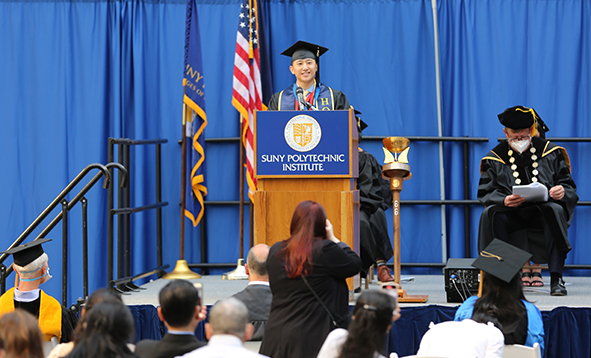
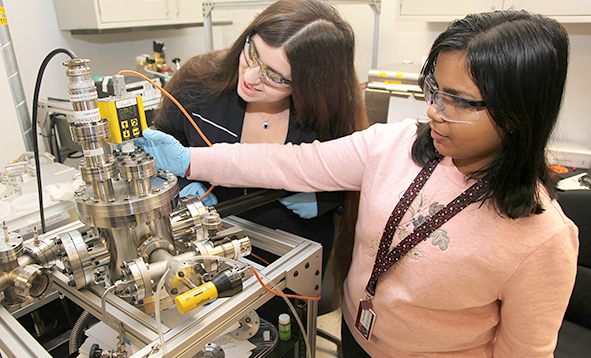
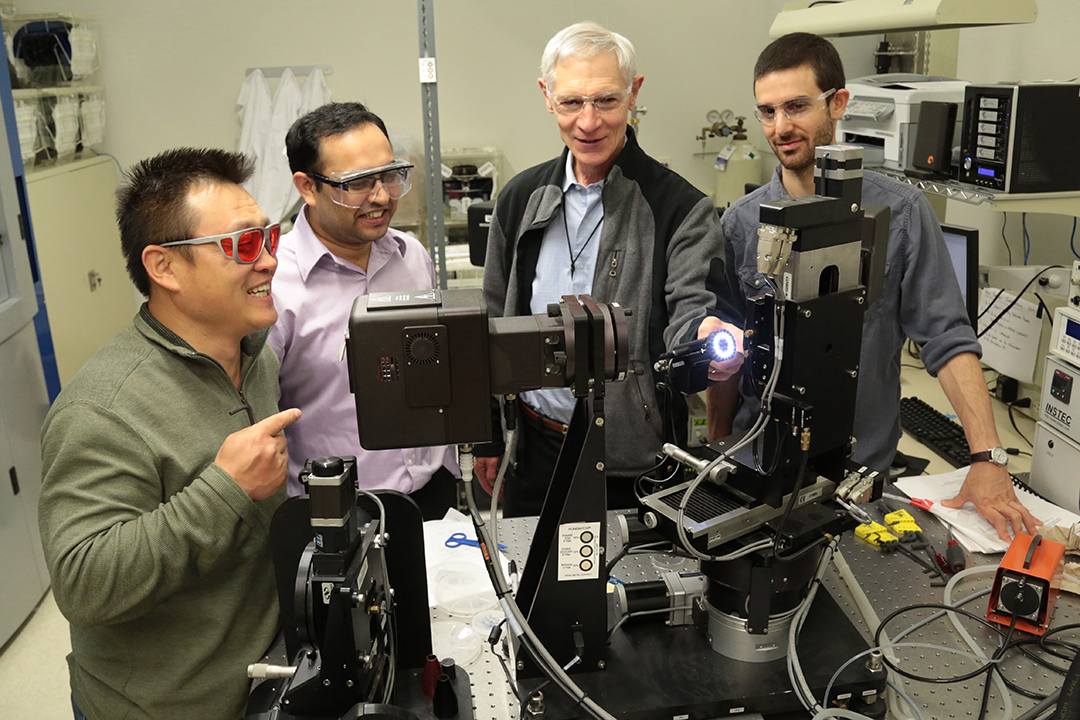
Office of Research + Graduate Studies

Over 20 SUNY Poly Students take part in SURP
SUNY Poly’s 10-week Summer Undergraduate Research Program (SURP) provides qualified undergraduate students with the opportunity to conduct research, as well as engage in an innovative hands-on experience to work with the university’s world-class faculty. In 2023, 21 students are participating in the program, with the overwhelming majority hailing from SUNY Poly. There are four SURP tracks students can be involved in: SURP-Funded Research, Faculty grant-funded SURP, Volunteer Positions, and Research for Credit. They are all supported by faculty and staff who are part of the 2023 SURP team: Dr. Carolyn Rodak; Dr. Ji Ung Lee; Dr. Rebecca Weldon; Elaine Garrett; Valerie Black; Dr. André Melendez; and Dr. Michael Carpenter. Click here to see what SUNY Poly students worked on this past summer.
SUNY Poly’s Nursing Program Deploys New Pelvic Simulator to Support Experiential Learning
The College of Health Sciences announced the addition of a brand new state-of-the-art pelvic simulator to its nursing program in January. Procured through a SUNY Performance Improvement grant meant to help address the urgent nurse shortage, this high-tech $57,000 simulator is designed to replicate the female pelvic exam and provide real-time feedback to students and faculty, enabling on-demand training. The simulator is used primarily in the Family Nurse Practitioner graduate program’s advanced health assessment course to help support student learning in a controlled environment before entering the clinical setting. In addition, it’s also available for use as part of the undergraduate student nursing health assessment course. Overall, it offers students the opportunity to gain additional practice with pelvic exams, something which is extremely important due to the limited access to clinical placements for Women’s Health. The simulator also provides students and faculty with valuable feedback regarding accuracy and pain/pressure measures. All SUNY Poly undergraduate and graduate students enrolled in the Health Assessment, Advanced Health Assessment, Women’s Health, and Primary Care courses will be able to use the simulator with faculty supervision. Read more.
NoMIS Power Announces Exciting Partnerships
In March, SUNY Poly spin-out NoMIS Power embarked on an exciting new partnership with global automotive leader Hyundai Group, South Korea to evaluate and develop novel power semiconductor device designs and packaging for high voltage power devices. Working in collaboration with a network of partners across areas related to materials, device design, fabrication, and packaging, the NoMIS team will explore the suitability of different novel device architectures and packaging approaches for high voltage applications. The project evaluates Gallium Oxide (Ga2O3) Schottky Diodes, MEtal-Semiconductor Field Effect Transistors (MESFETs), and Metal–Oxide–Semiconductor Field-Effect Transistors (MOSFETs) with different gate structures and field management approaches to identify a path to next-generation performance in wide-bandgap power semiconductor devices. Ultimately, this means the next-generation power semiconductor device could lead to potential applications that include improved electric vehicle motor drives and on-board/off-board chargers with enhanced power density and efficiency beyond today’s technological performances. NoMIS was also highlighted in the Albany Business Review as a reason to “move to the Northeast.” More recently, NoMIS Power received an award from the U.S. Air Force Research Laboratory (AFRL) to develop rugged Silicon Carbide (SiC) power devices to support the electrical power systems of aircraft. NoMIS Power will develop 1200 V SiC power semiconductor devices (PSDs) through the award. The focus will be on metal-oxide-semiconductor field-effect transistors (MOSFETs) with enhanced operational lifetime as well as improved on-state and off-state efficiency at operating temperatures, resulting in lower losses for power electronics engineers to manage. Read more.
SUNY Poly Professors, Students Publish Collaborative Research
Research by collaborators from SUNY Poly, SUNY Brockport, and Ithaca college published research in the Journal of Vacuum Science & Technology B titled, “Threshold switching stabilization of NbO2 films via nanoscale devices.” In it, the stabilization of the threshold switching characteristics of memristive NbOxNbOx is examined as a function of sample growth and device characteristics.
Interim Vice President of Research and Empire Innovation Professor of Nanobioscience Dr. Nathaniel Cady; Professor Emeritus and Empire Innovation Professor of Nanoscale Science Dr. Alain Diebold; with Post-Doc Dr. Maximilian Liehr; and alumni Jubin Hazra and Karsten Beckmann, who is also a SUNY Poly adjunct faculty member, also published, “Implementation of high-performance and high-yield nanoscale hafnium zirconium oxide based ferroelectric tunnel junction devices on 300 mm wafer platform,” in Journal of Vacuum Science & Technology B. That research focuses on hafnium zirconium oxide (HZO)-based 100 × 100 nm2 ferroelectric tunnel junction (FTJ) devices, which were “implemented on a 300 mm wafer platform (the platform upon which computer chips are built), using a baseline 65 nm CMOS process technology,” according to the research paper. The article summarizes the findings by indicating that “The realization of CMOS-compatible nanoscale FTJ devices on 300 mm wafer platform demonstrates the promising potential of high-volume large-scale industrial implementation of FTJ devices for various nonvolatile memory applications.”
John J. Sullivan Award Recipients Named
The John J. Sullivan Professional Development Award is bestowed to graduate students to further enable experiential and scholarly opportunities within nanotechnology or related fields during their studies. This award is intended to offset the cost of experiential and scholarly opportunities such as: Training events and programs; Research experiences – academic and within industry (domestic & international); Patent development; Workshop travel or attendance; Conference travel or registration; and other professional development activity as described in their applications. Award recipients recently presented about their experiences, as part of the SUNY Poly CNSE Colloquium Series. To watch these presentations, click here.
CNSE Alumna Pujhitha Ramesh Named Among Winners of the SUNY Chancellor Distinguished PhD Graduate Dissertation Awards
In January, State University of New York Chancellor John B. King, Jr. announced the winners of the Chancellor Distinguished PhD Graduate Dissertation Awards, which recognize work done across the 64-campus system to address some of society’s most pressing issues. SUNY graduates about 1,200 PhD students each year from its doctoral-granting campuses, with fields of study ranging from agriculture, biology, physics, and social sciences to engineering and the fine arts. Competitions such as the Dissertation Awards bring attention to the critical work being undertaken by the next generation of future leaders and researchers. CNSE alumna Pujhitha Ramesh, from the Department of Nanobioscience, was among a handful award finalists, for her dissertation titled, “Biomimetic Scaffolds Targeting Remediation of Fibrosis and Regeneration of the Salivary Gland.” Read more.
SUNY Poly Announces Second Cohort of CENN Fellowship Recipients
The Office of Research and Graduate Studies announced the Second cohort of New York State Center of Excellence in Nanoelectronics and Nanotechnology (CENN) Fellowship recipients as Ph.D. candidates Sri Saravana Bharathi, Yamini Kumaran, and Maria Belen Paredes-Espinosa, in January. The CENN is funded by the NYSTAR Division of Empire State Development and is hosted at CNSE. Part of the mission of the CENN is to have universities engage with and support private companies in emerging high-technology fields in New York State and to expand technology-related businesses and employment. The CENN Fellowship was initiated to support exceptional Ph.D. students to establish or further a collaboration with New York-based companies for up to one year. The three fellowship recipients are working with three faculty members in diverse technology areas. Read more.
Semiconductor Education and Training Pipeline Summit Held at Albany Nanotech Complex
Dave Czechowski, Hyde Park Central School District teacher for 17 years, spoke at the From Campus to Industry: A Semiconductor Education and Training Pipeline Summit at the Albany Nanotech Complex in June, featuring panelists from CNSE, who discussed “Strategies for Building Semiconductor Partnership Networks: Leveraging What Works and Expanding Capacity.” The Summit was sponsored by The Governor’s Office, SUNY, Empire State Development, the Business Council of New York State and the State Education Department, with the goal of bringing together K-16 educators and industry as partners to inform educators about what the semiconductor industry is, and what the potential career opportunities are in the industry. Read more.
SUNY Poly Students’ Research Paper Accepted to IEEE International Conference in Venice, Italy
The research paper of four of SUNY Poly’s Institute of Electrical and Electronics Engineers (IEEE) Club students titled, “Performance Analysis of Deployment Errors for a Two-Stage Antenna in CubeSat Constellations at THz Frequencies,” was accepted into the proceedings of the IEEE UCEAA Conference in November in Venice, Italy. Ultimately, if the research is deployed, it could lead to a novel breakthrough in the design of CubeSats, extremely small satellites that are usually a few centimeters in size that can be used in space. The new design would strengthen communication and data transmission in space, and help facilitate non-terrestrial networks. The group consists of electrical and computer engineering majors Isaac Martin, David Stark, and Luke Lauterbach, and electrical engineering technology major Devin DiTucci. They were advised by Assistant Professor of Electrical and Computer Engineering Dr. Arjun Singh.
Women in STEM event
Five Alumnae from the College of Nanoscale Science and Engineering’s Graduate program discussed their journey from youth into STEM careers at a Women in STEM event in December, presenting to current graduate, undergraduate, and K-12 students in-person and virtually. This year’s presenters were Eziafa Oduah ’22 (Hematology and Oncology Fellow at Virginia Commonwealth University’s School of Medicine), Illona Sitnitsky ’10 (World Wide Procurement, Assembly and Test, Texas Instruments), Sarah Ashmeg ’20 (Clinical Assistant Professor at UPMC Hillman Cancer Center), LayWai Kong ’11 (Senior Member of Technical Staff at Advanced Micro Devices, Inc.) and Caitlin Philippi ’18 (Plasma Etch Process Engineer Tokyo Electron). To watch their presentation, click here.
Ten SUNY Poly students named SUNY Graduate Diversity Fellows
SUNY Graduate Diversity Fellowships are awarded to current SUNY Poly graduate students in good academic standing with a minimum GPA of 3.0. During the application process, applicants have the opportunity to outline how personal experiences and backgrounds will contribute to expanding the diversity of SUNY Poly. For 2022-23, SUNY Poly awardees were Patsy Aversa, Nevila Burrja, Yunru Chen, Alexandria Cunningham, Kara Desiderio, Frederick Fougere, Geeta Harrinarain, Kevin Phillips, Mikal Sky-Shrewsberry and Tia Williams.
